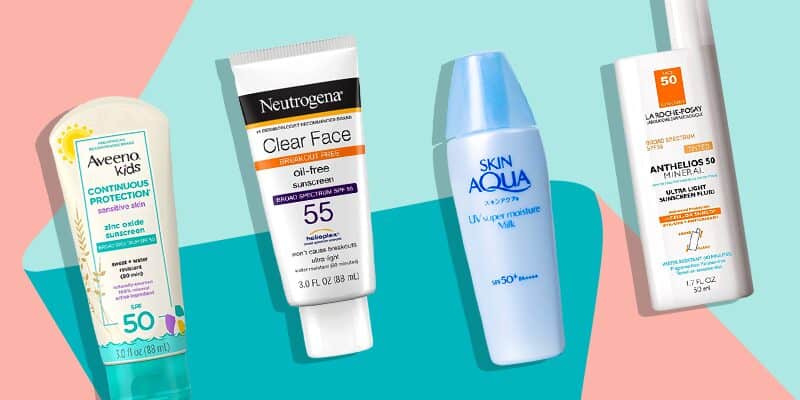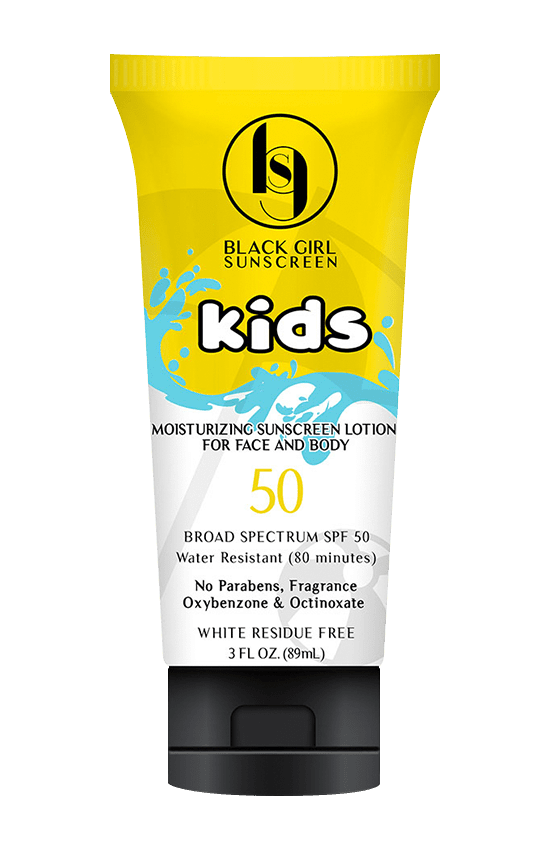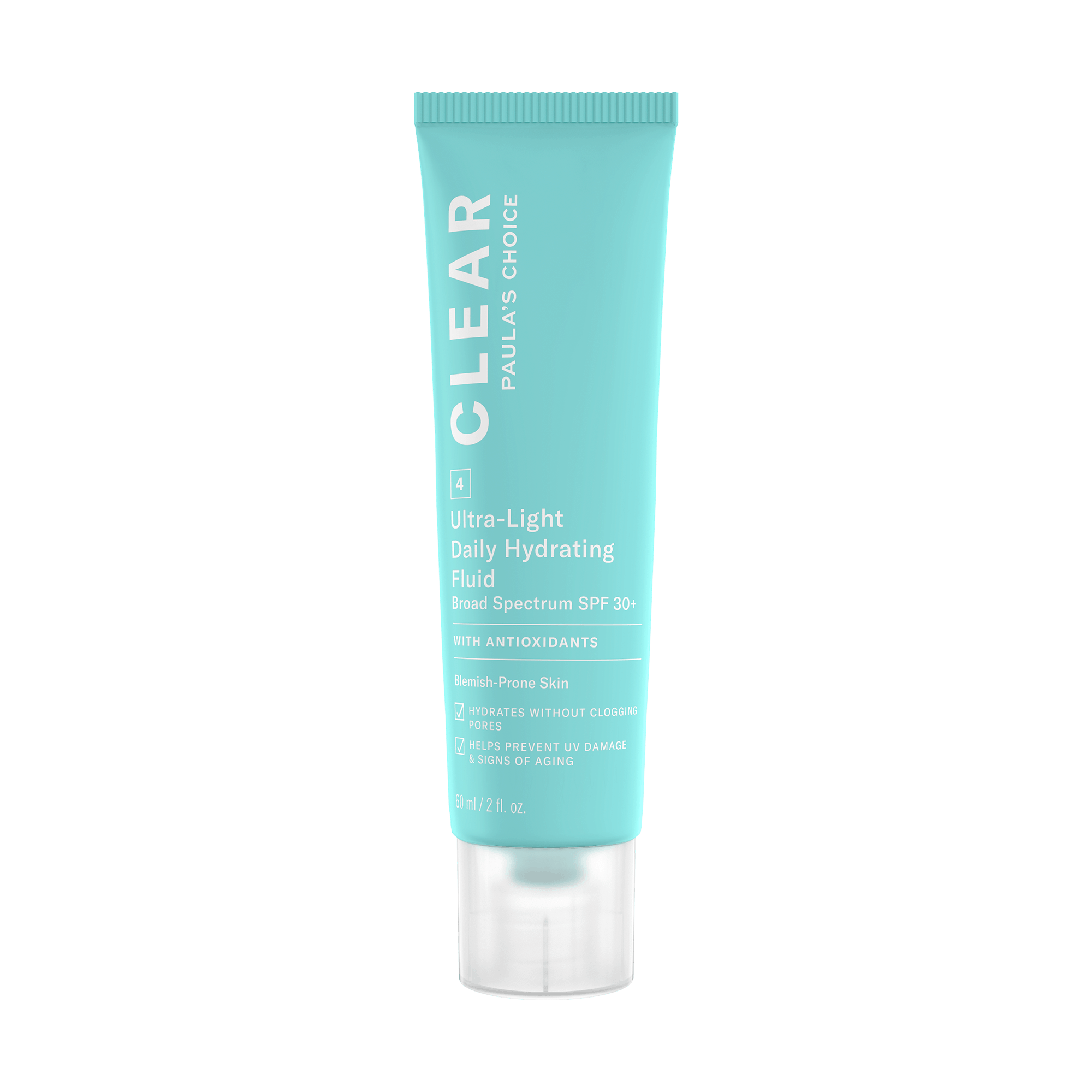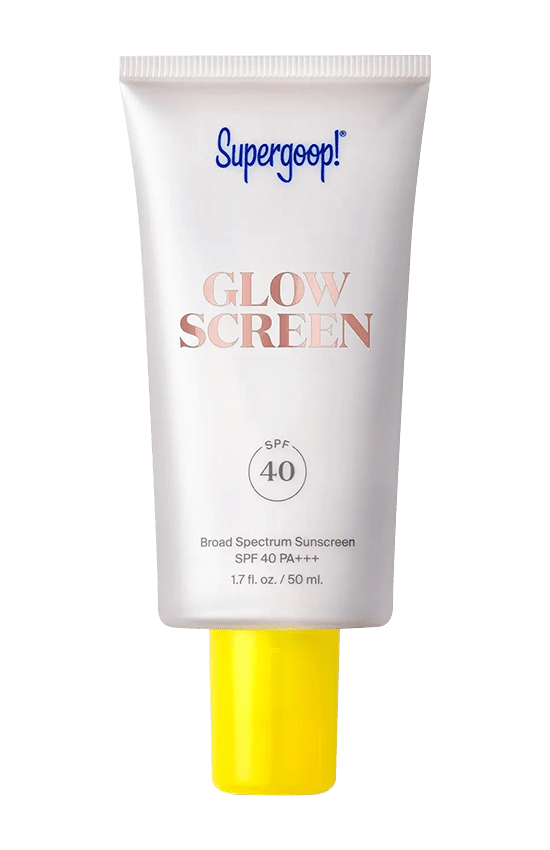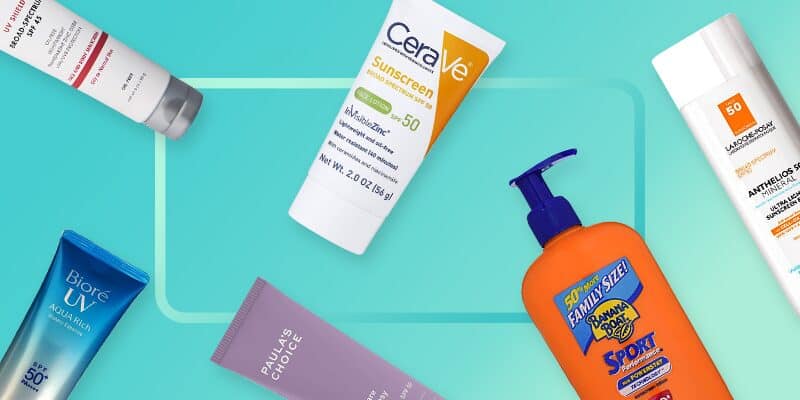We all know that it is important to wear sunscreen to protect the skin from damage. However, it isn’t always easy to find a facial sunscreen that works well with your skin type and budget.
We’ll cover the best facial sunscreens available, as well as a few tips to get the most protection.
Face vs. Body Sunscreens
Before diving into the best facial sunscreens, there is one question that needs to be answered: is there a difference between facial and body sunscreens?
In short, yes, there is a difference. Typically, facial sunscreens are created with the more delicate face skin in mind. This means that, ideally, facial sunscreens don’t contain ingredients that could irritate the skin or clog the pores.
When it comes to picking out sunscreen, you should be looking for an option for your face as well as a separate option for your body.
8 Best Facial Sunscreens
If you’re looking for a product to keep your face protected from the sun, these are the best facial sunscreens available for purchase.
1. Best Drugstore Facial Sunscreen: Neutrogena Clear Face
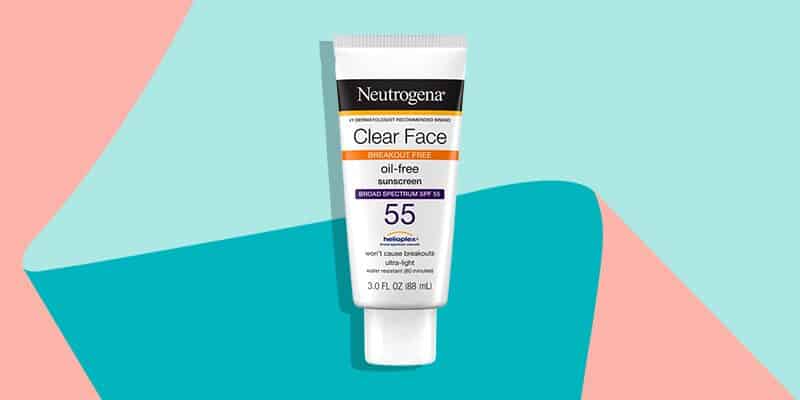
Neutrogena Clear Face Oil-Free Sunscreen Lotion, Broad Spectrum SPF 55 (Best Drugstore)
This sunscreen from dermatologist-recommended brand Neutrogena is budget-friendly and effective. The lightweight formula is oil-free, fragrance-free, and non-comedogenic, and is ideal for all skin types, including those with acne-prone skin who are worried about a sunscreen clogging pores. Once applied, it leaves a matte finish that isn’t greasy. The active ingredient is avobenzone, which provides UVA and UVB protection. This sunscreen has SPF 55, and is water-resistant for up to 80 minutes.
2. Best Facial Sunscreen for Oily Skin: La Roche-Posay Anthelios 50
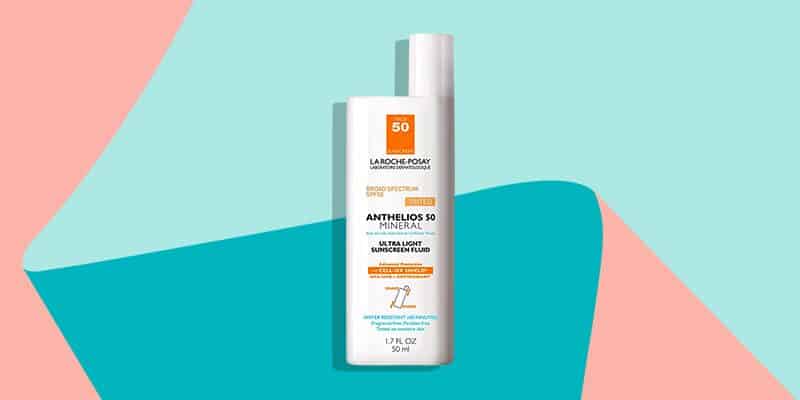
La Roche-Posay Anthelios Mineral Ultra-Light Fluid Broad Spectrum SPF 50 (Best for Oily Skin)
La Roche-Posay has created a lightweight UVA and UVB protection sunscreen that is particularly great for oily skin. It is oil-free, fast-absorbing, and has a matte finish that doesn’t feel greasy. This product is a mineral sunscreen, using 11% titanium dioxide as the active ingredient. A mineral sunscreen sits on the surface of the skin and provides a physical protection from the sun. Chemical sunscreens, on the other hand, create a chemical reaction and convert the UV rays into heat to prevent damage. The formula contains an antioxidant complex that further protects the skin from free radicals. It is also water resistant for up to 40 minutes. There is a tinted version available in three shades for light coverage, as well as an untinted version.
3. Best Facial Sunscreen for Sensitive Skin: Skin Aqua
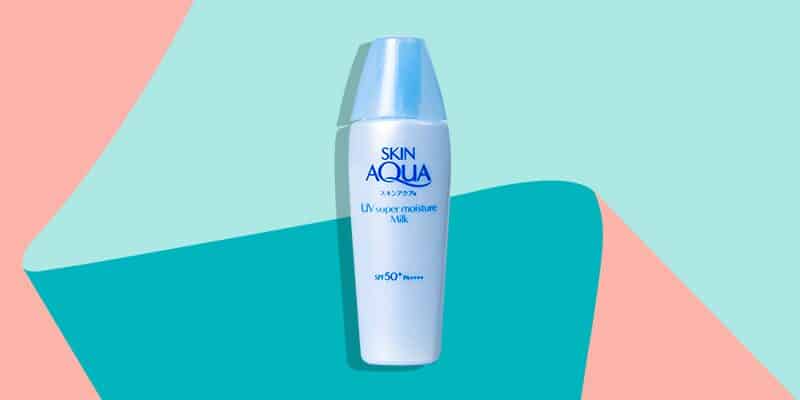
Skin Aqua Super Moisture Milk SPF 50 (Best for Sensitive Skin)
This sunscreen is free of fragrances, mineral oil, and color additives, making it one of the best facial sunscreens for those with sensitive skin. It also contains hyaluronic acid, which hydrates the skin. The sunscreen, which combines both mineral and chemical sun protection ingredients, has a lightweight, milky texture that is non-greasy and dries to a satin finish. It lasts up to 80 minutes in the water, making it suitable for the pool or beach.
4. Best Facial Sunscreen for Acne-Prone Skin: Biore UV Aqua Rich
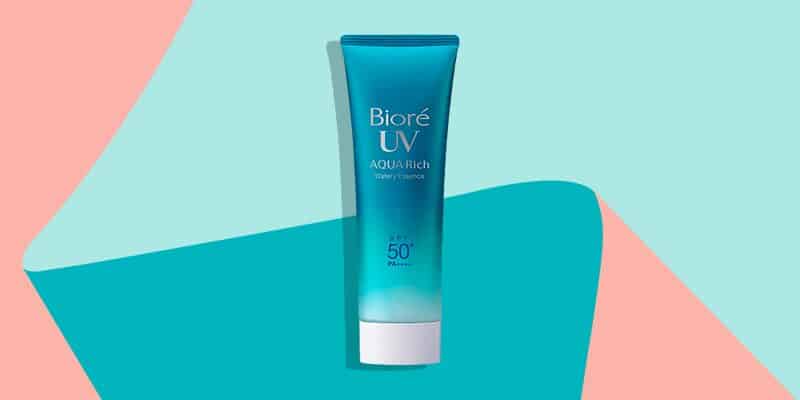
Biore UV Aqua Rich Watery Essence Sunscreen SPF 50 (Best for Acne-Prone Skin)
Many people with acne-prone skin are wary about using a sunscreen that might clog pores. This cult-favorite option from Biore is ideal for those with acne-prone skin, as it has non-comedogenic ingredients (meaning it won’t clog pores and cause breakouts). The formula has a lightweight, watery texture that absorbs quickly into the skin. It also contains hydrating ingredients, including hyaluronic acid and royal jelly extract. This sunscreen lasts for up to 80 minutes in water, and has both UVA and UVB protection.
5. Best Facial Sunscreen for Under Makeup: Australian Gold
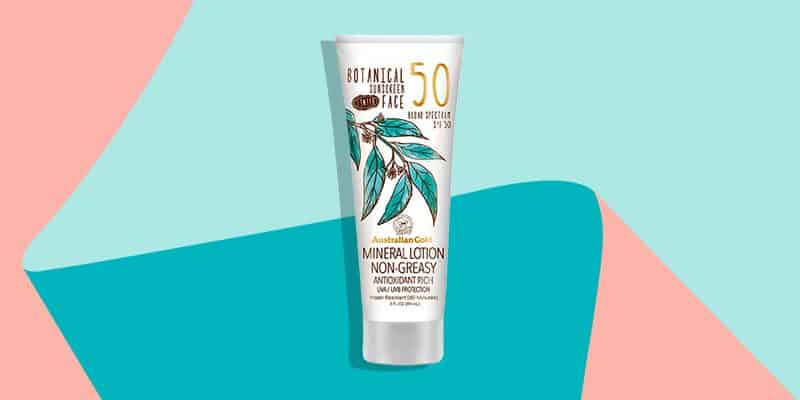
Australian Gold Botanical Sunscreen Tinted Face Mineral Lotion SPF 50 (Best for Under Makeup)
Makeup-wearers know that it is tricky to find a sunscreen that plays well with foundation. Thankfully, this sunscreen creates a smooth, matte base, making it one of the best facial sunscreens to wear under makeup. It is also lightly tinted, providing a blurring effect that minimizes imperfections. This is a mineral sunscreen that uses both titanium dioxide and zinc oxide to provide UVA and UVB protection that is water resistant for up to 80 minutes. It is free of parabens, fragrances, phthalates, oils, and dyes, and is also hypoallergenic, making it one of the best facial sunscreens for sensitive skin. Additionally, this sunscreen contains antioxidant-rich ingredients that nourish the skin, including kakadu plum, eucalyptus, and red algae.
6. Best Facial Sunscreen for Babies & Children: Aveeno
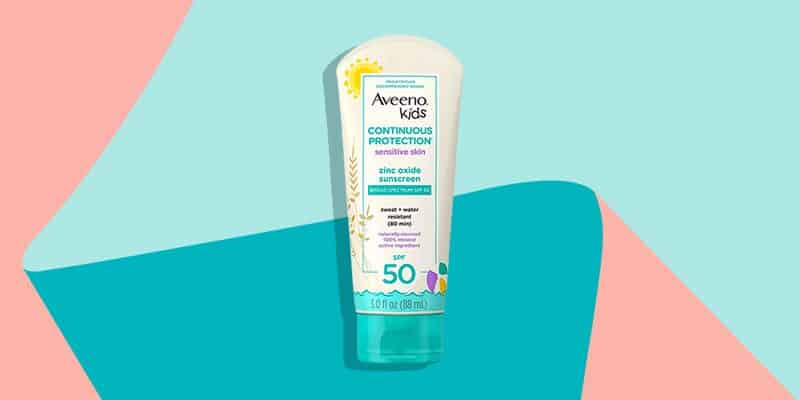
Aveeno Continuous Protection Zinc Oxide Mineral Sunscreen Lotion (Best for Babies & Children)
Babies and children need sunscreen that is formulated with their more delicate skin in mind. This option from Aveeno (which is a brand recommended by pediatricians) has a tear-free formula that is hypoallergenic, fragrance-free, and phthalate-free, making it one of the best facial sunscreens for younger children. It contains naturally-sourced zinc oxide that provides UVA and UVB protection, as well as skin-soothing oat. The formula is water-resistant for up to 80 minutes.
7. Best Natural Facial Sunscreen: Neutrogena Sheer Zinc
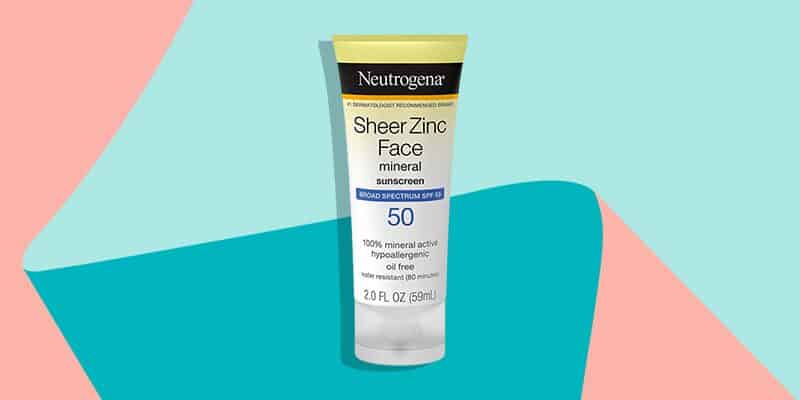
Neutrogena Sheer Zinc Oxide Dry-Touch Face Sunscreen SPF 50 (Best Natural Option)
If you are looking to take a more natural approach, you should try out this option from Neutrogena. This mineral sunscreen contains naturally-sourced zinc oxide, which provides UVA and UVB protection. The gentle formula is non-comedogenic, hypoallergenic, and free of oil, fragrance, parabens, phthalates, dyes, and irritating chemicals. This makes it ideal for even sensitive and acne-prone skin. Neutrogena’s sunscreen also contains antioxidants, which fight against skin-damaging free radicals. It leaves behind a sheer, non-greasy finish that layers well under makeup, if desired.
8. Best Reef Safe Sunscreen: Sun Bum Original SPF 50
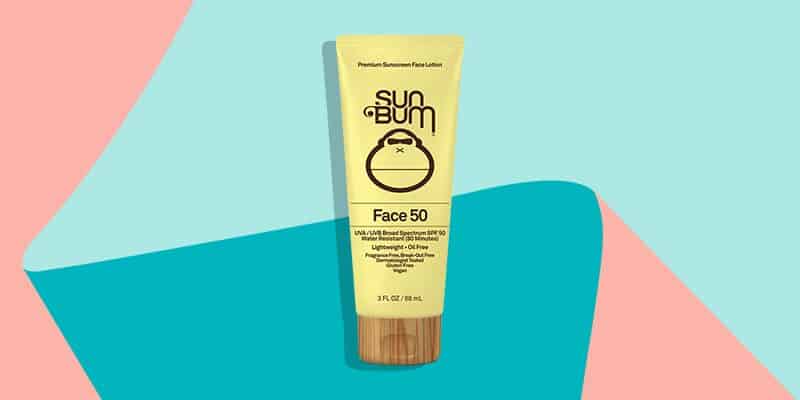
Sun Bum Original SPF 50 Sunscreen Face Lotion (Best Reef Safe)
If you’re looking for a reef safe sunscreen for your next trip to the beach, it is important to look out for two ingredients that are believed to contribute to coral bleaching: oxybenzone and octinoxate. Thankfully, this option from Sun Bum is free of both of those harmful ingredients, making it one of the best facial sunscreens for reef safety. It is also free of fragrance, parabens, and oil, and is hypoallergenic and cruelty-free. The non-comedogenic sunscreen is packed with vitamin E, and is water-resistant for up to 80 minutes.
How Much Sunscreen Should You Use on Your Face?
- You should apply about a nickel-sized amount of sunscreen to your face and neck for maximum protection.
- When applying, be sure to also get the ears, back of your neck, chest, lips, and exposed scalp.
- Keep in mind that sunscreen takes around 15 minutes to absorb into the skin.
This means that, rather than applying once you are already outside, you should apply sunscreen before heading out to allow for maximum protection.
How Often Should You Apply Sunscreen?
- When outside, reapply your sunscreen every two hours.
- You should be applying sunscreen daily, even when it is cloudy. 80% of the sun’s UV rays are still able to penetrate the skin under cloudy conditions.
- If you are swimming or sweating, check your sunscreen’s label about how often you should reapply. Water-resistant formulas typically need to be applied every 40 to 80 minutes.
FAQs
Should you use facial sunscreen every day?
Yes, you should be applying sunscreen with an SPF of at least 30 every day. This is true even if you won’t be outside for extended periods of time, or when it isn’t hot out.
Using sunscreen daily will not only prevent burning, but it will also prevent the skin from sun damage and tanning and prevent the development of premature visual signs of aging.
Do you need to use sunscreen when it’s cloudy?
Yes, it is essential that you still apply sunscreen when it is cloudy outside. Your skin is still susceptible to sun damage when the sun is blocked by clouds, as 80% of the sun’s UV rays are still able to penetrate the skin in these conditions.
How do you remove sunscreen from the face?
The best way to remove sunscreen from your face is using a double cleansing method. Start with a cleansing oil or micellar water to get the top layer of sunscreen and debris off of your face. Next, use a facial cleanser to remove any remaining residue. This will ensure any sunscreen and residue on the face is properly washed off.
How are you able to tell if sunscreen is causing breakouts?
If you are experiencing breakouts and suspect your sunscreen is the culprit, first look at the ingredient list. Look for comedogenic (pore-clogging) ingredients, like mineral oils, silicones, beeswax, plant wax, cocoa butter, coconut oil, or soybean oil.
If any of these are present, the sunscreen may be causing your breakouts, and you should cease use and see if your skin clears up.
Replace your sunscreen with another non-comedogenic option.
The Bottom Line
With so many options available, finding the best face sunscreen can difficult. However, when you know what to look for, it will be a lot easier. Any of the sunscreens mentioned above are great options to choose from, and will protect your face from being sunburned. And most importantly, remember to apply sunscreen every 2 hours, or every 40-80 minutes when swimming.
